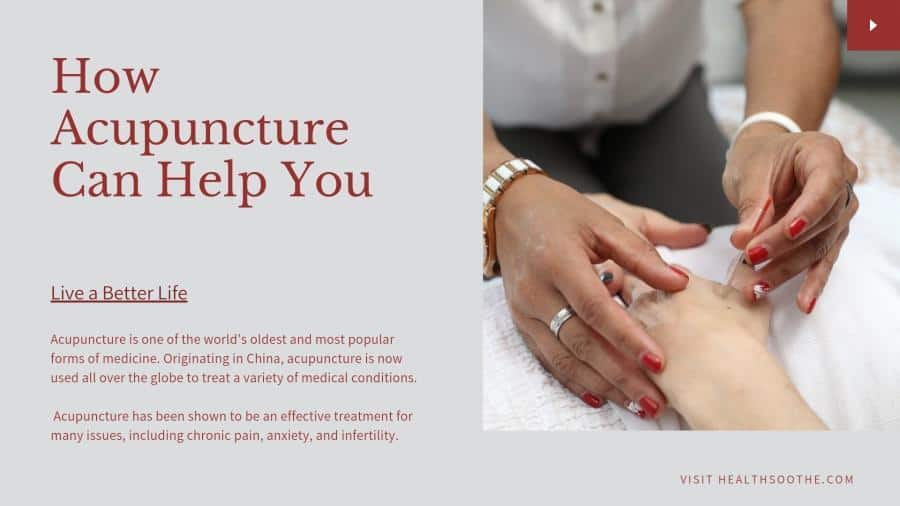The Benefits of Acupuncture for People with Chronic Illnesses
Image credit
Living with a chronic illness can be a challenging and exhausting experience. Traditional Living with a chronic illness can be difficult and draining. It's possible that conventional medical procedures don't always bring about the anticipated relief or deal with the condition's underlying causes. Many people with chronic illnesses have started using alternative therapies, like acupuncture, to supplement their standard medical care in recent years. The advantages of acupuncture for persons with chronic illnesses are examined in this article, along with how it can provide relief and enhance general wellbeing.
What is Acupuncture?
Acupuncture, an ancient practice originating from Traditional Chinese Medicine (TCM), involves the insertion of thin needles into specific points on the body to stimulate energy flow and promote healing.
The potential of acupuncture to help people with chronic illnesses, such as chronic fatigue syndrome (CFS), has come to light. CFS is a complex disorder characterized by persistent fatigue and cognitive difficulties. Many individuals with CFS have reported significant improvements in their symptoms through acupuncture for chronic fatigue treatments.
Pain Relief and Management
Chronic illnesses often come with persistent pain that can significantly impact one's quality of life. Acupuncture has long been recognized for its effectiveness in pain relief and management. By targeting specific acupuncture points associated with pain relief, the insertion of needles stimulates the release of endorphins and activates the body's natural painkillers. This can lessen chronic pain and lessen the need for painkillers, giving people a non-invasive and drug-free alternative to managing pain.
Reduction of Inflammation
Numerous chronic disorders, including rheumatoid arthritis, fibromyalgia, and Crohn's disease, have inflammation as a common underlying cause. By controlling the body's immunological response, acupuncture has demonstrated promise in lowering inflammation. According to studies, acupuncture can prevent the release of chemicals that cause inflammation and encourage the release of molecules that prevent inflammation. By reducing inflammation, acupuncture can help alleviate symptoms associated with chronic illnesses and potentially slow down disease progression.
Improved Sleep Quality
Sleep disturbances are prevalent among individuals with chronic illnesses, contributing to fatigue and exacerbating other symptoms. By encouraging relaxation and balancing the body's circadian rhythm, acupuncture has been demonstrated to improve the quality of sleep. By stimulating specific acupuncture points, acupuncture treatments can help individuals achieve better sleep patterns, experience deeper sleep, and wake up feeling more refreshed. Improved sleep quality can have a significant positive impact on overall well-being and the ability to cope with the challenges of chronic illnesses.
Enhanced Mental and Emotional Well-being
Having a chronic illness can have a negative impact on one's mental and emotional health, increasing stress, anxiety, and depressive symptoms. Acupuncture can provide much-needed support for individuals struggling with these aspects of their health. Acupuncture treatments help regulate the body's stress response, promoting a sense of calmness and relaxation. The release of endorphins during acupuncture sessions can also uplift mood and improve emotional well-being.
Holistic Approach to Health
The idea that the body, mind, and spirit are interrelated is one of the key principles of traditional Chinese medicine. This all-encompassing approach to health is one that acupuncture supports, addressing both the body's fundamental imbalances and its outward manifestations. By rebalancing the flow of energy, or Qi, acupuncture treatments aim to restore harmony and promote overall well-being. This comprehensive approach can result in a profound impact on individuals with chronic illnesses. Acupuncture sessions often involve thorough consultations with experienced practitioners who take into account the individual's unique health history, lifestyle, and emotional state. This personalized approach allows for a tailored treatment plan that addresses the specific needs of the individual, providing a comprehensive and holistic approach to managing chronic illnesses.
Despite the fact that acupuncture should not be considered a cure-all, it has been shown to be beneficial in reducing symptoms and treating a variety of ailments. Following are some instances of health issues that acupuncture may aid:
Musculoskeletal Disorders: Acupuncture has shown positive results in managing musculoskeletal conditions such as chronic back pain, neck pain, osteoarthritis, rheumatoid arthritis, fibromyalgia, and sports injuries. It can help reduce pain, inflammation, and muscle tension, and promote healing and improved mobility.
Digestive Disorders: Acupuncture may be beneficial for individuals with digestive disorders such as irritable bowel syndrome (IBS), gastroesophageal reflux disease (GERD), constipation, and nausea. It can help regulate digestive functions, reduce inflammation, and alleviate symptoms associated with these conditions.
Mental Health Conditions: Anxiety, sadness, stress, and sleeplessness are just a few of the mental health disorders that acupuncture can help with as an additional therapy. By promoting relaxation, reducing stress hormones, and improving sleep quality, acupuncture may help individuals experience relief from these conditions.
Women's Health Issues: Women's health difficulties include irregular menstruation, premenstrual syndrome (PMS), menopausal symptoms, reproductive problems, and pregnancy-related pain are frequently treated with acupuncture. It can help regulate hormonal imbalances, alleviate pain, and support overall reproductive health.

